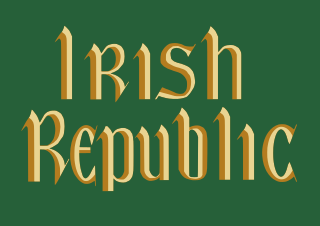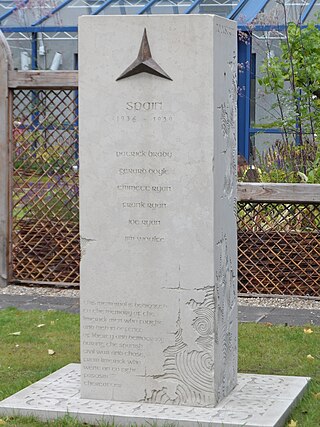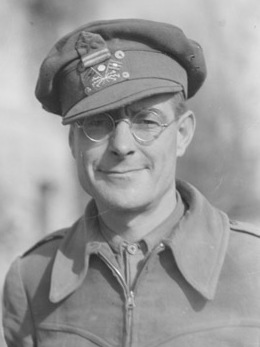
Erich Ernst Paul Honecker was a German communist politician who led the German Democratic Republic from 1971 until shortly before the fall of the Berlin Wall in November 1989. He held the posts of General Secretary of the Socialist Unity Party of Germany (SED) and Chairman of the National Defence Council; in 1976, he replaced Willi Stoph as Chairman of the State Council, the official head of state. As the leader of East Germany, Honecker was viewed as a dictator. During his leadership, the country had close ties to the Soviet Union, which maintained a large army in the country.

Samuel George Montague Nathan was an English soldier who served in the British Army during World War I, the Royal Irish Constabulary's Auxiliary Division during the Anglo-Irish War and the International Brigades in the Spanish Civil War. During his service in the Auxiliary Division, Nathan was suspected of being involved in the assassination of two Sinn Féin politicians, which later contributed to the alienation of Irish volunteers in the International Brigades from their British counterparts during the Spanish Civil War.

James Larkin, sometimes known as Jim Larkin or Big Jim, was an Irish republican, socialist and trade union leader. He was one of the founders of the Irish Labour Party along with James Connolly and William O'Brien, and later the founder of the Irish Worker League, as well as the Irish Transport and General Workers' Union (ITGWU) and the Workers' Union of Ireland. Along with Connolly and Jack White, he was also a founder of the Irish Citizen Army. Larkin was a leading figure in the Syndicalist movement.

The Communist Party of Ireland (CPI) is an all-Ireland Marxist–Leninist communist party, founded in 1933 and re-founded in 1970. It rarely contests elections and has never had electoral success. The party is a member of the International Meeting of Communist and Workers' Parties.

Michael O'Riordan was the founder of the Communist Party of Ireland (3rd) and also fought with the Connolly Column in the International Brigades during the Spanish Civil War.

The Connolly Youth Movement is an all-Ireland Marxist–Leninist youth organisation named after revolutionary socialist, James Connolly. Until 2021 it was affiliated with the Communist Party of Ireland. It is a member of the World Federation of Democratic Youth.

Margot Honecker was an East German politician and influential member of the country's Communist government until 1989. From 1963 until 1989, she was Minister of National Education of the German Democratic Republic (GDR). She was married to Erich Honecker, leader of East Germany's ruling Socialist Unity Party from 1971 to 1989 and concurrently from 1976 to 1989 the country's head of state.

The Communist Party of Germany is an anti-revisionist Marxist-Leninist communist party in Germany. It is one of several parties which claim the KPD name and/or legacy. It was founded in Berlin in 1990. The party is also commonly referred to by the name KPD-Ost to differentiate it from other parties with the same name, most prominently the historical Communist Party of Germany.

The Connolly Column was the name given to a group of Irish republican socialist volunteers who fought for the Second Spanish Republic in the International Brigades during the Spanish Civil War. They were named after James Connolly, the executed leader of the Irish Citizen Army. They were a company-strength unit of the XV International Brigade, which also included the US, British and Latin American battalions in Spain. The name is now retroactively applied to all Irish volunteers who fought for the Spanish Republic.

Ewart Milne was an Irish poet who described himself on various book jackets as "a sailor before the mast, ambulance driver and courier during the Spanish Civil War, a land worker and estate manager in England during and after World War 2" and also "an enthusiast for lost causes – national, political, social and merely human".

The Spanish Civil War lasted from July 17, 1936 to April 1, 1939. While both sides in the Spanish Civil War attracted participants from Ireland, the majority sided with the Nationalist faction.

Charles Desmond Greaves was an English Marxist activist and historian. He wrote a number of books on Irish history as a Marxist historian. A member of the Communist Party of Great Britain, through the Connolly Association he was one of the key figures, along with Roy Johnston, responsible for inserting Marxist perspectives into the 1960s Irish republicanism, in relation to the Northern Ireland civil rights movement.

Anarchism in Ireland has its roots in the stateless organisation of the tuatha in Gaelic Ireland. It first began to emerge from the libertarian socialist tendencies within the Irish republican movement, with anarchist individuals and organisations sprouting out of the resurgent socialist movement during the 1880s, particularly gaining prominence during the time of the Dublin Socialist League.

Irish Socialist volunteers in the Spanish Civil War describes a grouping of IRA members and Irish Socialists who fought in support the cause of the Second Republic during the Spanish Civil War. These volunteers were taken from both Irish Republican and Unionist political backgrounds but were bonded through a Socialist and anti-clerical political philosophy. Many of the Irish Socialist volunteers who went to Spain later became known as the Connolly Column.

Paul Verner was a German communist politician. He joined the communist movement at a young age and went into exile during Adolf Hitler's rule. Verner became a prominent political personality in the German Democratic Republic after the war.

Robert Andrew Doyle was a communist activist and soldier from Ireland. He was active in two armed conflicts; the Spanish Civil War as a member of the International Brigades and the Second World War as a member of the British Empire's Merchant Navy.

The Communist Party of Ireland (Marxist–Leninist) was an anti-revisionist political party based in Ireland. It had strong links to the Party of Labour of Albania, Communist Party of Canada (Marxist–Leninist) and Revolutionary Communist Party of Britain (Marxist–Leninist).

Max Samuel Levitas was an Ireland-born British communist activist and councillor, prominent in the East End of London for many years. The brother of communist activist Maurice Levitas, Max Levitas was a member of the Young Communist League and later the Communist Party of Great Britain.

Patrick Joseph Read, was an Irish Anarchist who served in World War I, the Irish Civil War and the Spanish Civil War. He is sometimes incorrectly called Reid or Reade.


















